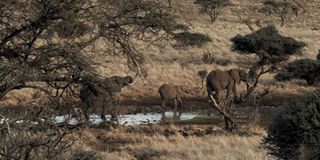Pro-wildlife charity hails Kenya’s efforts in fighting poaching

Elephants take an early morning walk in the Lewa Wildlife Conservancy. Born Free USA has commended Kenya for its sustained efforts in fighting the poaching of ivory. FILE PHOTO | NATION MEDIA GROUP
What you need to know:
- It hails the new punitive laws that have seen game trophy trade and all game related offences being treated as economic sabotage crimes.
- However, the report notes that “corruption has ensured only the small fish are nabbed and not the kingpins.”
- Somalia is blamed for being the source of poaching gangs, especially those linked to Al-Shabaab.
- Al-Shabaab provides poachers in Kenya with firearms and cash.
A pro-wildlife charity has commended Kenya for its anti-poaching war saying the gains made could be more if state officials known to condone transportation of illegally harvested ivory through its ports are exposed.
In its report titled 'Out of Africa; Mapping the Global Trade in Illicit Elephant Ivory,' Born Free USA hails the new punitive laws that have seen game trophy trade and all game related offences being treated as economic sabotage crimes.
However, the report notes that “corruption has ensured only the small fish are nabbed and not the kingpins.”
The report has been prepared by The Center for Advanced Defense Studies’ data analysts Varun Vira, Thomas Ewing, and Jackson Miller.
Recently, a Kenyan human rights group claimed that 18 poachers have been killed in the past three years by Kenya Wildlife Service rangers in an effort to cover up their own collusion in elephant poaching and hence perpetrating the ivory trade within the expansive Tsavo National Park.
The revelation is contained in a report set for release this week which was widely reported by the Associated Press and an array of news websites across the world.
PROTECT ANIMAL HABITAT
The anti-poaching war also enjoyed a commitment by private wildlife sanctuary owners who teamed up with local communities living in wildlife rich areas to share tourism wealth thereby ensuring wild animals and their habitats are protected.
This has resulted to locals getting better incomes and also the implementation of community projects by hospitality firms.
The Born Free USA report says that addressing poverty among communities leaving in elephant rich areas could greatly curb poaching thereby giving elephants a new lease of life.
It adds that helping Somalia get out of lawlessness could help reduce the threat of poaching of wildlife along its borders with elephant rich conservancies in neighbouring countries like Kenya.
Somalia is blamed for being the source of poaching gangs, especially those linked to Al-Shabaab rebel group that provides poachers in Kenya with firearms and cash.
VIOLENT POACHERS
The report prepared by the non-profit group, C4ADS on behalf of Born Free USA warns that poaching in Kenya is steadily increasing, and that Kenyan poachers are particularly notable for their high levels of violence when confronted by wildlife rangers.
“Kenya’s largest port of Mombasa is currently the continent’s single most active ivory trafficking hub, servicing much of Central and East African with 2,828 kilogrammes of ivory being nabbed in 2014.
It however observes that the newly enacted The Wildlife (Conservation and Management) Act has acted as a major deterrence to ivory trafficking.
The illegally harvested ivory is mainly sourced from the Democratic Republic of Congo (DRC), Cameroon, Central African Republic (CAR), South Sudan as well as in Kenya, says the report.
The report recommends the scaling off transit routes to curb illegal ivory trade an all-out war be waged by all stakeholders including governments, conservationists and citizens with one message – that wildlife is a national resource.
MILITARISED TRADE
“We found an industrial level of slaughter in a highly militarised trade that is funding a wide range of destabilising actors across Africa.
“East Africa has clearly eclipsed West and Southern Africa as the primary gateway,” it says adding that the continent’s most active ivory export hub is Kenya’s Mombasa port.
The pro-charity lobby recommends that true beneficiaries who consign cargoes, bankroll transactions and ultimately reap the financial rewards of ivory trade be pinned down through intensive investigations of key networks and entities, facilitated by sharing of historical and current data between state and non-state actors.
“Poachers and their mastermind networks together with other forms of illicit trafficking (including the trade in drugs, weapons and minerals) and all financial activities must be identified along the supply chain with enforcement agencies given ultimate instructions to act decisively.
“This is the only way of wiping out the kingpins who both facilitate and service multiple syndicates,” the report says.
TRADERS SHUN JKIA
The four month probe notes that stringent measures have seen ivory traffickers shun Nairobi’s Jomo Kenyatta International Airport (JKIA) but emerging proof shows Mombasa’s Kilindini port is a major transit point where kingpins collude with dubious clearing and forwarding firms registered locally and abroad.
The analysts believe that wildlife trade must be treated as international crime since it destabilises states through proliferation of illegal firearms found to have been used in fuelling inter-ethnic crimes while at the same time being used to kill elephants.
“It also amounts to a massive illicit financial transfer out of the poorest communities in Africa towards some of the most destabilising and destructive actors on the planet, including internationally organised crime syndicates, warlords, corrupt politicians and even extremists, insurgents, and terrorists.
“There is little doubt that the illicit ivory trade is no longer just a conservation issue, but has evolved from an opportunistic and artisanal trade to a multi-million dollar criminal enterprise spanning continents,” it says.
Clearing and forwarding companies at the port must also be scrutinised and punitive measures enforced on anyone found to have allowed ivory to pass disguised as timber, avocados, nuts, copper or bananas. Such firms should be blacklisted.
“This effort is likely to have a sizable spill-over impact on all forms of illicit trade, given the networked nature of ivory and wildlife product traffickers.





